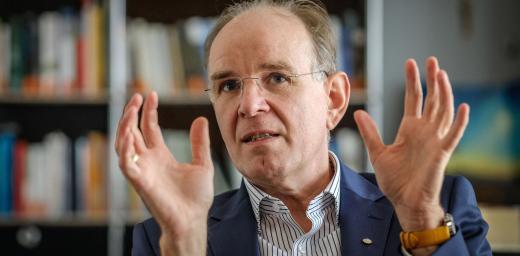Germany: Online church “does not always have to be complicated”

Like many of his colleagues, Social Media Coordinator Karsten Kopjar has spent a lot of time working in his home office in the past months. Photo: private
Voices from the Communion: Karsten Kopjar, Social Media Coordinator of the Evangelical Church in Central Germany
(LWI) - “I enjoy the possibilities of using the internet to engage with very different people and to experience spirituality together with them,” says Dr. Karsten Kopjar, Social Media Coordinator of the Evangelical Church in Central Germany (EKM).
The media scientist and theologian obtained his doctorate in communication, focusing on online spirituality. He is committed to developing online services for his church with ideas, creativity, and inspiration.
In this interview, he talks about ways and means of being a church digitally in times of the pandemic, bringing people together, accompanying them, and being the church in interactive ways.
What has Advent been like this year, and how are you preparing for Christmas in the EKM?
Even though events entailing in-person contacts, such as Christmas markets, festive church services, and concerts are not possible, many congregations find opportunities to meet at a distance and prepare for Christmas together.
For example, many church members join small meditative celebrations; home devotions are taking place as well. To support this, the EKM has provided an “audio pilgrimage” with readings, hymns, contemplative texts, and music. Through our online church, onlinekirche.ekmd.de which functions as an internet congregation, we offer prayers and church services with interactive elements and spaces for personal prayer as well as meetings with other members, interested parties, and friends of the online church.
Numerous musicians, choirs, and ensembles present Advent hymns in the singing Advent calendar.
This amounts to a colorful mix of face-to-face and digital options.
What is the significance of social media in the current situation?
An essential part of being the church is encounter and meeting one another. And social media can serve as a platform for this. When quarantine and contact restrictions lead to loneliness, creative approaches are needed to support community experiences.
In the EKM, a weekly evening devotion – #trotzdemverbunden – by our leading bishop Friedrich Kramer who presents a song and a prayer, has been running on Facebook since March. It is nothing complex, but there has been a lot of positive feedback.
Of course, there are also challenges: people posting unnecessary criticism and misunderstandings because of misinterpreted comments or posts. In such cases, it helps to politely ask what the other person wanted to express, excuse small mistakes, and send positive messages yourself.
Do you think online Christmas is a (good) option?
Conducting an online meeting for Christmas with relatives who live far away is a great way to keep in touch when you cannot visit each other. However, if the family lives close by and the restrictions allow, an evening together in the living room is undoubtedly nicer than just seeing each other on the screen. Here, people must decide for themselves which format is appropriate.
What have the congregations and institutions in the EKM learned in the past months?
At the beginning of the contact restrictions, many congregations started offering church services via the internet using basic methods. That was creative and very committed. Technically, it was not always perfect, and some of those involved learned a lot during the year. Good camera work, lighting, sound, and a suitable setting have improved many productions’ quality. Some services are streamed live from the church so that people can interact directly. Others are elaborately pre-produced, showing multiple settings and perfectly styled imagery.
This does not have to be as elaborate as a professional television team would work; good sound quality and a personal connection with the audience, places, or themes is often enough to get people excited. In some cases, significantly more people attended online services than coming to church in person.
By now, many congregations are thinking about how they can stay in touch with these people in the long run while simultaneously continuing the usual face-to-face program with other members. Ideally, these methods would complement each other. It is up to each congregation to decide its specific approach.
What is the significance of ecumenical and international relations, for example, with The Lutheran World Federation, in the current situation?
The crisis first affected congregations locally. Everyone had to find solutions to their individual problems. However, many of them quickly realized that other local congregations (e.g., Catholic or Free Churches) had very similar issues and began to collaborate. Joint worship services, collaborative online formats, joint training programs emerged. This has brought new energy into ecumenical relations.
The pandemic has also increased the awareness of Christians around the globe. Similarities and differences in dealing with the crisis have emerged, and our shared faith has been strengthened. Many congregations have become more aware of existing international partnerships and have used the newly discovered digital technology to stay connected globally.
What is your personal Christmas message this year?
God becomes human! In being one of us, he makes himself small to show us what unconditional love is. We can follow this example. We can treat ourselves and our fellow human beings well, even in small encounters.
Maybe we can thank someone or call up a lonely person and spend some time with them – be it through digital means or over a cup of tea. These small personal encounters are often more important than large projects.
The Lutheran World Federation is a global body that shares the work and love of Christ in the world. In this series, we profile church leaders and staff as they discuss topical issues and set out ideas for building peace and justice in the world, ensuring the churches and communion grow in witness and strength.



